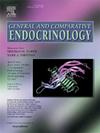Low-temperature-induced disruption of reproductive axis and sperm vitality via stress axis in Monopterus albus
IF 1.7
3区 医学
Q3 ENDOCRINOLOGY & METABOLISM
引用次数: 0
Abstract
The ricefield eel (Monopterus albus) is inherently timid and highly sensitive to stress. Our previous studies have shown that low-temperature weather could significantly affect the sperm vitality of ricefield eels. This study aims to investigate the regulatory mechanism of low-temperature effects on testicular function and sperm vitality in ricefield eels. The ricefield eels were initially reared at low (10 °C) and normal (25 °C) temperatures for 24 h. Low temperatures were found to induce the expression of pituitary pro-opiomelanocortin (POMC) and testes insulin-like growth factor-binding protein 1 (IGFBP1) mRNA expression, suggesting that the reduction in sperm vitality could be attributed to the activation of the stress axis. Moreover, the results indicated a significant decrease in sperm occupancy and count in the testes, along with a reduced percentage of motile sperm. Subsequent transcriptome analysis showed substantial inhibition of reproductive hormone genes (gnrh1, lh, and fsh) in the brain and pituitary, and downregulation of meiosis-related genes (dmc1, rec8, and sycp3) in the testes. These findings suggest that low temperatures might disrupt testicular development and spermatogenesis by inhibiting the reproductive axis. Metabolomics analysis then demonstrated a significant reduction in the levels of metabolites related to glycolysis, fatty acid metabolism, and the tricarboxylic acid (TCA) cycle in the testes after low-temperature treatment. Interestingly, the expression of zona pellucida sperm-binding proteins 3 and 4 (ZP3 and ZP4), which may affect sperm vitality and spermatogenesis, was significantly induced by low temperatures in the testes. In conclusion, these findings suggested that low temperatures might affect testicular function and sperm vitality by simultaneously activating the stress axis and inhibiting the reproductive axis and energy metabolism in the testes.
低温通过应激轴诱导白翅猴生殖轴和精子活力的破坏。
稻田鳗(Monopterus albus)天生胆小,对压力高度敏感。以往的研究表明,低温天气会显著影响稻田鳝的精子活力。本研究旨在探讨低温对稻田鳝睾丸功能和精子活力的调控机制。在低温(10 °C)和常温(25 °C)下分别饲养稻田鳝鱼24小时。低温诱导垂体促绒毛膜促皮质素(POMC)和睾丸胰岛素样生长因子结合蛋白1(IGFBP1)mRNA的表达,表明精子活力的降低可能是应激轴被激活所致。此外,研究结果表明,睾丸中精子的占有率和数量显著下降,活动精子的比例也有所降低。随后的转录组分析表明,大脑和垂体中的生殖激素基因(gnrh1、lh和fsh)受到严重抑制,睾丸中的减数分裂相关基因(dmc1、rec8和sycp3)下调。这些发现表明,低温可能会通过抑制生殖轴来破坏睾丸发育和精子生成。代谢组学分析表明,低温处理后,睾丸中与糖酵解、脂肪酸代谢和三羧酸循环有关的代谢物水平显著降低。有趣的是,睾丸中可能影响精子活力和精子发生的透明带精子结合蛋白 3 和 4(ZP3 和 ZP4)的表达受到低温的显著诱导。总之,这些研究结果表明,低温可能会同时激活睾丸的应激轴和抑制生殖轴及能量代谢,从而影响睾丸功能和精子活力。
本文章由计算机程序翻译,如有差异,请以英文原文为准。
求助全文
约1分钟内获得全文
求助全文
来源期刊

General and comparative endocrinology
医学-内分泌学与代谢
CiteScore
5.60
自引率
7.40%
发文量
120
审稿时长
2 months
期刊介绍:
General and Comparative Endocrinology publishes articles concerned with the many complexities of vertebrate and invertebrate endocrine systems at the sub-molecular, molecular, cellular and organismal levels of analysis.
 求助内容:
求助内容: 应助结果提醒方式:
应助结果提醒方式:


